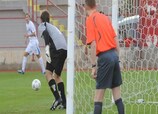Five referees on IFAB agenda
Monday, February 22, 2010
Article summary
The continuing experiment involving two additional assistant referees is one of the items on the agenda for the International Football Association Board's annual general meeting on 6 March.
Article top media content

Article body
The ongoing experiment with two additional assistant referees, currently taking place in the UEFA Europa League, is one of the items on the agenda for the 124th annual general meeting of the International Football Association Board (IFAB) in Zurich, Switzerland, on 6 March. The progress of the experiment will be discussed at the latest meeting of football's lawmakers.
The IFAB was founded in 1886, and is composed of The Football Association (England), the Scottish Football Association (SFA), the Football Association of Wales (FAW), the Irish Football Association (IFA) and FIFA. The IFAB has historically held the position as guardian of the Laws of the Game.
The experiment with two additional assistant referees is being undertaken in a major European club competition after being endorsed by both FIFA and the IFAB. In addition to the referee, two assistant referees and the fourth official, the two additional assistant referees take up positions alongside each goal, with the mission of focusing on incidents happening in the penalty area. Considerable support has been forthcoming for the experiment, given that the extra pairs of eyes are helping referees in the decision-making process.
The agenda for the meeting, which will be chaired by FIFA – as is tradition in the year of the FIFA World Cup – includes proposed amendments to Law 1 (The Field of Play) in respect of goalposts, and Law 5 (The Referee) of the Laws of the Game, relating to the treatment of a player on the field of play.
Among the other matters submitted for discussion are sending-off offences, specifically the act of denying a goal or obvious goalscoring opportunity; feinting in the run-up to take a penalty kick; the role of the fourth official; and an update and discussion on the latest developments concerning goal line technology.


